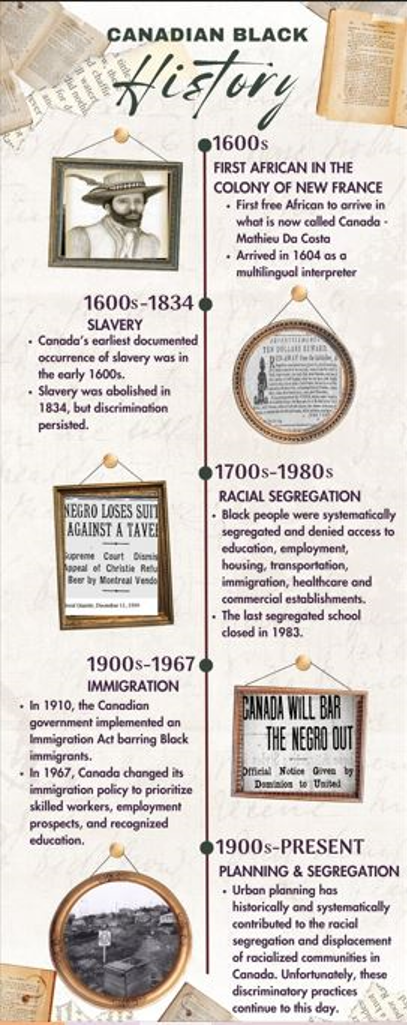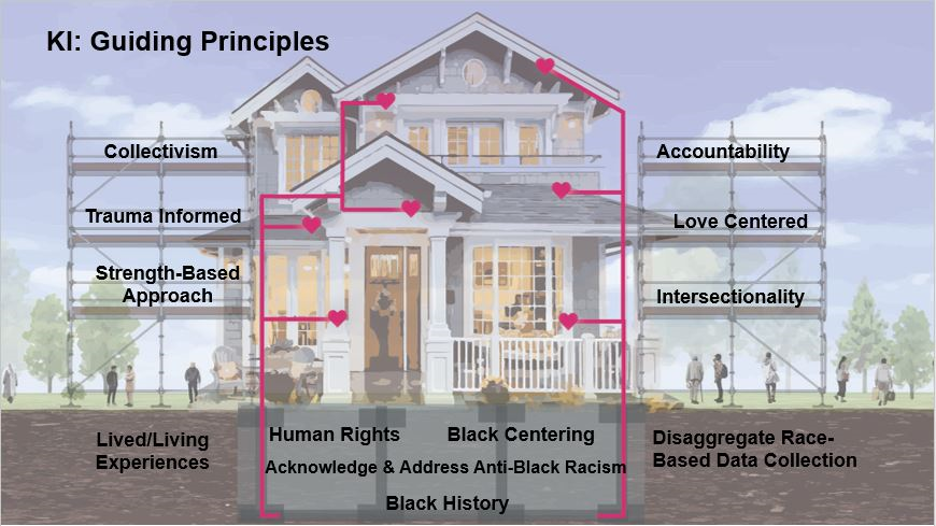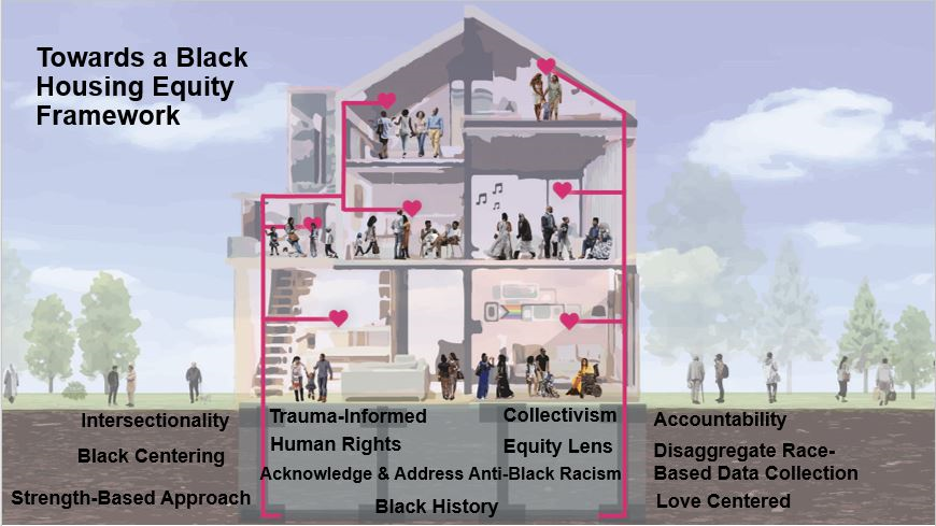During the 2022 National Conference on Ending Homelessness (CAEH), I began discussing a doctoral research project I have been working on since 2021. This research aims to create a framework that addresses anti-Black racism in the housing and homelessness sector. During this year's conference, I will provide an update on the progress of this project. This blog post will give an overview of the achievements made so far.
Including Afrocentric Research Methodologies
While conducting my research, I recognized that the initial methodologies selected imposed limitations, particularly in not centring Black voices. To address this challenge, I opted to integrate an Afrocentric research methodology into my approach. This methodology centers on including the voices and perspectives of Black communities. My research now utilizes the principles of Afrocentrism to ensure a nuanced understanding of the challenges that Black communities experience. This will help to create a more informed approach to developing a framework to combat anti-Black racism in the housing and homelessness sector.
Preliminary Results
Since my presentation at the 2022 CAEH Conference, I have been conducting literature reviews on Black history in Canada, anti-Black systemic racism, and the housing experiences of Black Canadians. Additionally, I have conducted my first set of interviews with Black individuals in the shelter system and key informants.
Past: Literature Review on Black History in Canada
To better understand the current housing inequities Black communities face, it is crucial to understand the history of Black Canadians.
Existing literature suggests that Black Canadian's experiences with housing precarity and social inequities are rooted in Canada's historical legacy of legalized slavery, dispossession, racial segregation, racism and discrimination towards Black people. Literature also highlighted that Black Canadians are disproportionately represented in various sectors, including but not limited to the justice system, healthcare, education, employment, and housing. This over-representation can be attributed to racist and discriminatory policies and practices. Some of the historical events that have led to present inequities include:
 1600s: First African - The first free African to arrive in what is now called Canada – Mathieu Da Costa was a multilingual interpreter.
1600s: First African - The first free African to arrive in what is now called Canada – Mathieu Da Costa was a multilingual interpreter. - 1600s – 1834: Slavery - Canada's earliest documented occurrence of slavery was in the early 1600s. Slavery continued until 1834.
- 1700s – 1980s: Racial Segregation - Black people were systematically segregated and denied access to education, employment, housing, transportation, immigration, healthcare, and commercial establishments. The last segregated school was closed in 1983.
- 1900s – 1967: Immigration - In 1910, the Canadian government implemented an immigration act barring Black immigrants from entering Canada. In 1967, Canadian immigration policy changed and now assesses immigrants based on skills, employment prospects, and recognized education.
- 1900s – Present: Planning and Segregation - Urban planning has historically and systematically contributed to the racial segregation and displacement of racialized communities in Canada. Unfortunately, these discriminatory practices continue to this day.
Present:
1. Interviews with Black People with Lived/Living Experience (BPWLE)
Interviews with seven BPWLE living in an emergency shelter revealed that systemic failures across multiple sectors due to anti-Black racism can lead to housing insecurity.
Education Sector:
During one of my interviews with a BPWLE living in an emergency shelter, they shared that there was significant anti-Black racism present within the education sector. They explained that as a Black child, teachers imposed negative stereotypes on them and viewed them as unintelligent and aggressive.
"…They treat other kids better compared to us. For little things, you get into trouble, and they take you into the office and give you suspension – one week or two weeks. They don't give you chances. I have seen White kids bringing knives to school and bear mace; they are given chances."
They also shared that they felt as if their teachers were less patient with Black students in comparison to their White peers. Teachers were less likely to review concepts a second time and frequently expected Black students to "figure it out themselves."
Unfortunately, racial discrimination against Black students in schools can have negative consequences that extend beyond the classroom. These students are more likely to drop out of high school and less likely to attend college, which can adversely affect their future earnings and economic stability. This, in turn, may make it difficult for them to find affordable housing. Moreover, discrimination in schools can also fuel the school-to-prison pipeline, where students are pushed into the criminal justice system instead of being given the opportunity to thrive in school. This can lead to a criminal record, further damaging their chances of securing employment and housing.
The Justice System:
Black people in the shelter system reported instances of racial profiling by the police in public spaces. They shared that the police tend to view them as criminals, leading to illegal searches and detentions for up to 24 hours.
"The policing is really bad. I have been in multiple situations where me and my friends are driving, a cop will be driving in a different direction and see us and turn around. Stop us and search us; call the gang unit. Every time there are like 10 cop cars stopped and searching us. And then let us go when they don't find anything… (on other occasions) they will just stop us and ask our names. Even if it is illegal. If we don't give it to them, then they put us in a cell for 24 hours and then let us go."
They also shared that they have had negative encounters with the police from a young age, negatively impacting their ability to find meaningful employment as adults.
"They put you in the system at a young age. They put a curfew on you, and you can't go to work. They call your house, and if you are not there, they arrest you. You are in the system."
Racial profiling by the police is a clear example of how systemic racism disproportionately impacts Black communities. This practice often results in Black individuals being targeted, arrested, and charged with minor offences, even if they have not committed any crime. These charges can lead to a criminal record, which can make it more challenging for them to secure meaningful employment, pay rent or maintain a home.
Housing:
Several interviewees shared their experiences of discrimination based on race and difficulty accessing housing. One interviewee described the negative impact that social housing had on him, stating:
"My experience with social housing has always been traumatizing for me. Here I am waiting for four years; I got a place and only stayed for three months before getting kicked out because they said I wasn't using the place."
During the interview, the interviewee mentioned that he felt lonely in his unit after transitioning from the shelter and would often return to the shelter just to be around people. He stated culturally appropriate services would have helped him settle into his unit and avoid eviction. Other interviewees also emphasized the need for culturally appropriate programs and services. However, the lack of understanding of the needs of Black individuals and the absence of culturally appropriate support makes it difficult for them to access and maintain appropriate housing. Additionally, interviews revealed that some people experienced racial discrimination while trying to access social housing. For instance, an elderly interviewee recounted their experience with a White female manager at a social housing building who, during their initial meeting to tour an available unit, took one look at them and decided they were unfit for the property. As a result, this individual was returned to the waitlist while staying in an emergency shelter.
Housing discrimination is a significant issue that disproportionately affects Black individuals. Such discriminatory practices can lead to housing insecurity, limiting the housing options for Black individuals and forcing them to live in overcrowded or inadequate dwellings. In extreme cases, it can even lead to homelessness, as discrimination can hinder individuals from obtaining housing altogether. Beyond the practical consequences, housing discrimination can have a severe emotional toll on Black individuals and families. It can cause feelings of isolation, depression, and anxiety, which can negatively impact their well-being. This emotional impact can make it even more difficult for individuals to advocate for their housing needs, worsening their housing insecurity.
2. Interviews with Key Informants:
Nine key informants identified guiding principles that they believe should be included in the framework. These guiding principles include:

- Understanding Black History
- Acknowledge and Address anti-Black racism
- Human Rights Approach
- Equity Lens
- Centering Black Perspectives and Lived/Living Experience
- Relationship-centred
- Trauma-Informed
- Strength-Based Approach
- Love-centred
- Planning for Intersectionalities
- Disaggregate Race-Based Data Collection
- Collectivism
- Accountability
Incorporating these guiding principles into a Black Housing Equity Framework will serve as a tool to guide policymakers and housing practitioners in developing and implementing equitable policies, programs, and services.
 Key Takeaways:
Key Takeaways:
To date, my work on this project has highlighted an emergent need to address anti-Black racism in the housing sector in a culturally appropriate manner.
Based on the interviews and literature review conducted, it is clear that anti-Black systemic racism is prevalent in all sectors. It also became apparent through this work that the lack of representation in the housing sector and all sectors can create barriers for Black people to access services.
Another key lesson learnt has been that systemic failures due to anti-Black racism and a lack of targeted interventions have created pathways to housing insecurity for Black Canadians. This learning will become crucial when moving on to the next stage of this project – designing the framework.
Next Steps: Nov. 2023 – June 2024
- Design the framework.
- Conduct a second set of interviews to gather additional feedback on the framework.
- Test and evaluate the application.
- Document results.
_____
This post is part of our #CAEH23 blog series which highlights research on preventing and ending homelessness that is being presented at the 2023 National Conference on Ending Homelessness, November 8-10 in Halifax, NS. Learn more about the authors' work through their presentation in the Learning from New Approaches to Homelessness and Housing Support - (SI) session on Wednesday, November 8th at 1:30 pm.

